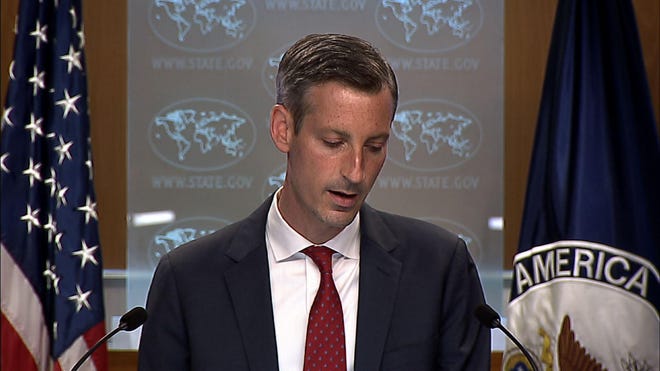In the crush and chaos of people trying to get out of the country are thousands of Afghans who served the U.S. government in some capacity over the course of the 20-year war.
These could be interpreters, drivers or people who worked on military bases, qualifying them for a special immigrant visa (SIV), and making their family members eligible to follow.
Some 4,130 SIV holders arrived in the United States between Oct. 1 and July 31, the most recent data available. Add in other Afghan refugees, who qualified for different reasons, and the total arrivals tops 5,100.
New York state had welcomed just 150 through July, trailing far behind states like California, Texas, Virginia and Washington where totals were in the hundreds. The Refugee Processing Center, an agency of the U.S. State Department, updates its numbers at the end of each month, so August totals are not yet available.
President Biden said Friday that 18,000 people had been airlifted from Afghanistan in recent days, a total that presumably includes Americans, whom he said are being given priority.
Rochester and Albany saw among the highest numbers heading into the rush of the past month.
Nearly 70 Afghan special immigrant visa holders have come to Rochester since Oct. 1.
The Rochester resettlement program operates out of the Catholic Family Center, where Lisa Hoyt is director of refugee services. She received notice on July 27 from the U.S. Conference of Catholic Bishops of plans to evacuate 750 to as many as 1,500 with special immigrant visas. The initial approval was for the city to resettle 52 of them, but that later was increased and could reach 90 without additional approvals required.
Rochester has, over the past four years, welcomed 165 refugees from Afghanistan.
“Obviously this situation is new in the sense that we are responding and reacting to a very fluid situation,” Hoyt said.
Lauren Frye is the volunteer coordinator for the Catholic Family Center. With just a few hours’ notice, she and other volunteers furnish a house in the Rochester area in preparation for the arrival of an Afghan family.
As the volunteers focus on their best efforts to make the house warm and welcoming, they must also prepare for the state of mind the arriving families find themselves in.
“I was meeting with a woman who was just crying because she was working in the US embassy, and she left so many people behind,” Frye said. “Our Afghan families hold so much guilt now that they’re here.”
Gay-Doh Htoo, a volunteer, working alongside Lauren Frye, was relocated from a Thailand refugee camp to the Rochester area through the Catholic Family Center. As he hustles to make beds and arrange furniture in the sweltering heat, he admitted that even though he is safe in this country, the urge to go back home never dissipates.
“Sometimes you feel like you don’t belong here,” Htoo said. “I love the United States, and I have a lot of opportunities here, but sometimes I want to go back to visit my grandmother and my cousins.”
Gay-Doh does his best to use his own experiences to help incoming families, but a language barrier can make the task difficult. Nevertheless, providing reassurance for new arrivals is paramount to aiding the transition process.
“The situation is a shock for people,” Lauren Frye said. “Telling them it’s going to get better and constantly reassuring them that they will receive the help they need to become independent is important.”
Arrivals could outpace capacity
“The challenge with this particular situation is that resettlement site may only get one or two days’ notice that a case is coming,” said Shelly Callahan, director of The Center, formerly known as the Resource Center for Refugees in the Mohawk Valley.
Typically there is a one- or two-week lead time.
The Center is based in Utica and has had roughly three dozen arrivals from Afghanistan in recent months, none carrying special immigrant visas.
The unpredictability, “likely means housing may not be ready as it normally is,” Callahan continued, and the nonprofit resettlement agencies “may have to use hotels and motels as temporary housing. We have a rental property we keep as temporary housing but numbers could outpace capacity. Hotels and motels are expensive.”
In Rochester, Hoyt said, a number of landlords have partnered with the agency to provide temporary housing. Saints Place helps with furnishings. Volunteers set up the residences and shop, day of, for culturally appropriate food to stock refrigerators.
New arrivals still were coming in recent days, with little notice, officials said. Now there is likely to be a pause, as the last chartered flight for refugees was Monday. The ability for SIV holders to arrange their own travel out of Afghanistan has passed. Now it is down to military transport, with refugees routed to Ft. Lee in Virginia for processing.
Coming to America from a war-torn country is often a mixed bag, said Mario Russell, director of Catholic Charities Immigrant and Refugee Services.
“There’s an enormous amount of pain of leaving your country, of leaving your neighbors, your friends, the smells, the sights, the sounds,” Russell said. “There’s also the stress of leaving under conditions (of persecution).”
At the same time, he said, there is enormous relief after being relieved of persecution and excitement on the promise of America.
Catholic Charities staffers have seen that sentiment repeatedly as they accepted 13 Afghan people in the last 10 days in the New York City area, the organization said Thursday. Nationally, the organization has thus far taken on 40% of the special immigration visa population nationally.
Russell said there has been an uptick of evacuations from Afghanistan, but it is unclear how many more families will be assigned to the charity.
“Although families are not being evacuated as quickly as I think is necessary and as any of us would’ve liked,” he said, “it is happening on a much quicker scale than it was a year ago or three months ago.”
Still, he said, the organization is “prepared to do and receive as many as we are assigned.”
Once the families make the journey to the New York City area, Catholic Charities continue to assist them. The staff works with them to ensure they have necessities such as food, toiletries, and subway cards. They also help them in locating a job and figuring out the area. Gradually, Russell said, the initial strain changes to deal with the new realities of America. But, he said, even that is infused with seeing “how much they can progress” and “how much they can achieve.”
That all takes time.
“It’s a bit fragile now,” Hoyt said, when asked about access to speak with recently arrived refugees. “People are a bit shook up.”
What can communities do? “Kindness,” Callahan said.
“Be welcoming,” she said,” and patient. Let the resettlement agencies let the community know what they need, like housing or household goods or clothing. It may be awhile, because it’s happening so fast.”
Contact reporter Brian Sharp at bdsharp@gannett.com or at 585-258-2275. Follow him on Twitter @sharproc. This coverage is only possible with support from our readers.
Helping hand:Here’s how to help people fleeing Afghanistan and the families still in the country
More:The Bible tells us so: Why American Christians should welcome Afghan refugees








